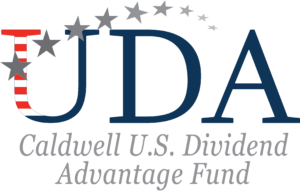For the month of May, the Caldwell U.S. Dividend Advantage Fund (“UDA”) gained 0.13% versus a decline of 0.9% for the S&P 500 Total Return Index (“Index”)1. The Energy sector recorded its fifth consecutive month as a notable outperformer, led by persistently high oil and natural gas prices. Utilities and Financials rounded out the remaining two top spots while Real Estate, Consumer Discretionary and Consumer Staples were relative laggards. We believe the combination of growing recession concerns and high inflation weighed on the performance of the laggards, including normally defensive Consumer Staples companies, which have battled rising input costs and margin compression for a number of quarters.
Top performers in the month of May were Devon Energy (“DVN”, +27.4%), Coterra Energy (“CTRA”, +20.1%) and EOG Resources (“EOG”, +16.1%), all of which continued to benefit from a high energy price environment. Given that the stock prices of all three companies are up more than 50% year to date (“YTD”), where do we go from here? We continue to believe the structural shift within the industry toward capital spending discipline and sustainable shareholder returns is underappreciated by investors: in aggregate, the Energy sector is expected to account for roughly 8% of the Index’s total earnings in 2022 yet it only holds a 5% weight in the Index . Demand for air travel is rebounding strongly, and labour shortages and capacity limitations at oilfield service companies naturally restrict the pace at which new wells can be drilled, thus supporting a “higher for longer” oil price environment. Anecdotal evidence from recent investor conferences leads us to believe that despite the year-to-date run, there is limited interest in the sector from generalist investors (rather than sector specialists). Lastly, company-specific catalysts such as improving cost structures and dividend initiations/raises continue to play out at the top performers noted above. We acknowledge the various political risks regarding energy policy/trade in the current environment, but the factors above contribute to our positive outlook on the sector.
Rising rates and inflation continue to dominate the market narrative, especially since the former poses a risk to higher multiple stocks that currently have an outsized weighting in major market benchmarks. However, given its unique momentum-driven investment approach and focus on well-managed, dividend growth companies, we believe UDA is well positioned to provide strong performance by way of both attractive regular monthly distributions and long-term capital appreciation potential. We expect that dividend growth investing, which has been foundational to the Fund’s investment approach, will continue to provide a means of generating compelling risk-adjusted returns for our investors over the long term.
1Standard performance as at May 31, 2022:
Caldwell U.S. Dividend Advantage Fund Series F: 1 Year: 4.9%, 3 year: 9.6%, 5 year: 7.8%, Since Inception (June 19, 2015): 8.5%.
S&P500 Total Return Index: 1 Year: 4.4%, 3 year: 13.9%, 5 year: 11.9%, Since Inception (June 19, 2015): 13.1%.
2Actual investments, first purchased: DVN 01/19/2022, CTRA 01/19/2022, EOG 03/02/2022.
All data is as of May 31, 2022 sourced from Morningstar Direct or S&P Capital IQ, unless otherwise indicated. Fund returns are from FundData. UDA, Index total return numbers, sector returns and individual stocks returns are in CAD terms. The Fund was first offered to the public as a closed-end investment since May 28, 2015. Effective November 15, 2018 the Fund was converted into an open-end mutual fund such that all units held were redesignated as Series F units. Performance prior to the conversion date would have differed had the Fund been subject to the same investment restrictions and practices of the current open-end mutual fund.
The information contained herein provides general information about the Fund at a point in time. Investors are strongly encouraged to consult with a financial advisor and review the Simplified Prospectus and Fund Facts documents carefully prior to making investment decisions about the Fund. Commissions, trailing commissions, management fees and expenses all may be associated with mutual fund investments. Rates of returns, unless otherwise indicated, are the historical annual compounded returns including changes in unit value and reinvestment of all distributions and do not take into account sales, redemption, distribution or optional charges or income taxes payable by any unitholder that would have reduced returns. Mutual funds are not guaranteed; their values change frequently and past performance may not be repeated. The payment of distributions should not be confused with a fund’s performance, rate of return or yield. If distributions paid are greater than the performance of the fund, your original investment will shrink. Distributions paid as a result of capital gains realized by a fund, and income and dividends earned by a fund, are taxable in your hands in the year they are paid. Your adjusted cost base (“ACB”) will be reduced by the amount of any returns of capital and should your ACB fall below zero, you will have to pay capital gains tax on the amount below zero.
Publication date: June 9, 2022.
